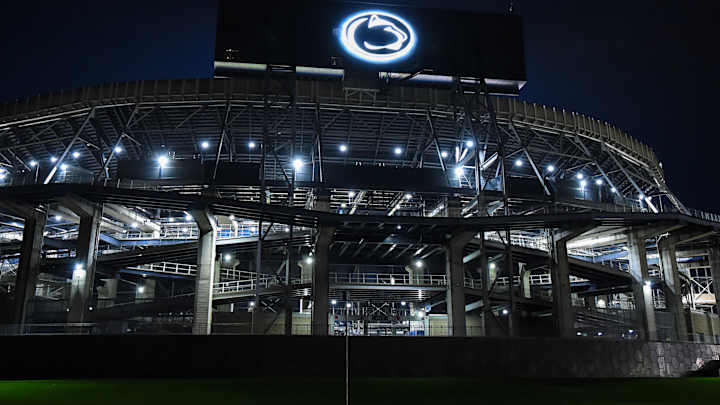Why Going #PSUnrivaled Makes Sense for Penn State in the Big Ten

In this story:
At first glance, Penn State seemed to be missing its invitation to the new Big Ten. The conference's other 15 teams, including five that joined after Penn State, retained at least one rivalry game in the Big Ten football scheduling model that begins in 2024. Penn State is the only program without one.
Does that mean Penn State has no defined Big Ten rival? In a sense, yes. Is that negative? Not necessarily. Actually, Penn State essentially is a conference independent, which affords scheduling leeway other programs don't have. It's forward-looking and acknowledges that tradition exists while being unbound to it. It's a good place for Penn State.
The Big Ten recently announced its new scheduling model for the 16-team football conference that will include USC and UCLA beginning in 2024. The schedule features 11 so-called "protected" games, or rivalry games, that will continue to be played annually. The list includes those dear to the Big Ten's heart: Ohio State-Michigan, Minnesota-Wisconsin, Michigan State-Michigan, Purdue-Indiana, Northwestern-Illinois and, of course, newcomers Rutgers-Maryland and USC-UCLA.
While every other team plays at least one annual rivalry game (Iowa gets three), Penn State goes it alone. Penn State didn't necessarily explain why, referring a request for explanation to the Big Ten. The conference didn't respond, though Big Ten Chief Operating Officer Kerry Kenny told The Athletic that, well, 11 rivalry games seemed like enough.
"With Penn State in particular, we obviously know that they've got some competitive rivalries, some regional rivalries, some trophy-game rivalries," Kenny said according to The Athletic. "Ohio State-Penn State was definitely on the table for discussion. But where we landed with the final 11 projected opponents was what the entire group felt was in kind of the right spot for us to land to be able to make this model work moving forward."
Penn State fans have known that for the better part of three decades that their football team hasn't built a true, embittered Big Ten rival. No doubt, individual games have generated moments of rivalry: Tony Johnson being ruled out-of-bounds on a fourth-quarter catch vs. Michigan in 2002, those extra 2 seconds at Michigan in 2005, Ohio State's bonus time for a field goal in 2014, Maryland refusing a captains' handshake in 2014, the Iowa fake-injury fiasco of 2021, etc.
But these moments of sports hate don't necessarily have to be resuscitated annually. Instead, Penn State can play a rotating three-team cluster on the Big Ten's Flex Protect Plus plan without having to bang heads against Ohio State, Michigan, Michigan State or Iowa annually. It's a win for the Lions.
To continue rivalry games, the Big Ten asked programs to request them. Naturally, Ohio State and Michigan requested The Game, as did other programs playing for axes, buckets and pigs. But Penn State and its potential rivals chose not to request games. Which makes sense.
Why would Ohio State and Michigan want to continue playing Penn State as well if, as the Big Ten says, the scheduling model is designed to "create access for programs into an expanded College Football Playoff"? Similarly, why would Michigan State? And why would Rutgers and/or Maryland (a combined 2-14 vs. Penn State since joining the Big Ten) want to host Penn State for what has amounted to regional recruiting opposition research every other year?
If Penn State doesn't have to visit Ohio State (where it's 2-13 since joining the Big Ten) every other year, that's a competitive win. If the Terps (3-42-1 lifetime against Penn State) don't have to play the Lions annually, that's a win for them. As Maryland coach Mike Locksley said before playing Penn State in 2022, "It's not a rivalry game. Obviously we have to compete a little better to get it to that level."
There are some caveats. Without a protected rival, Penn State is at the mercy of central scheduling. That could affect ticket sales. Of the 10 largest crowds at Beaver Stadium, seven were for games against Ohio State or Michigan. Neither visits Penn State during the 2025 season, whose Big Ten home schedule is meager: Illinois, Minnesota, Rutgers, and UCLA. The non-conference opponents (so far Nevada and Villanova) bring no heat, so unless Penn State adds a blockbuster noncon game, 2025's home card is pretty bland. That might be a good year for Penn State to accelerate renovation plans at Beaver Stadium.
Penn State coach James Franklin foreshadowed this moment in 2015. A year before, Penn State introduced #PSUnrivaled as a branding concept and social media hashtag for a program with a first-year coach coming out of NCAA sanctions. So at Big Ten media days, Franklin was asked who is Penn State's rival. “If you look at Penn State historically, we have not really had a true rival per se in the Big Ten," he said.
Penn State now exists in a rivalry limbo where it has parted ways with Pitt while not shifting that sports venom elsewhere. Does the Land Grant Trophy really make anyone take sides? Yet that's OK. For the rest of the Big Ten, annual rivalries are bloodsport. But at Penn State, going unrivaled might make more sense.

Mark Wogenrich is the editor and publisher of Penn State on SI, the site for Nittany Lions sports on the Sports Illustrated network. He has covered Penn State sports for more than two decades across three coaching staffs, three Rose Bowls and one College Football Playoff appearance.